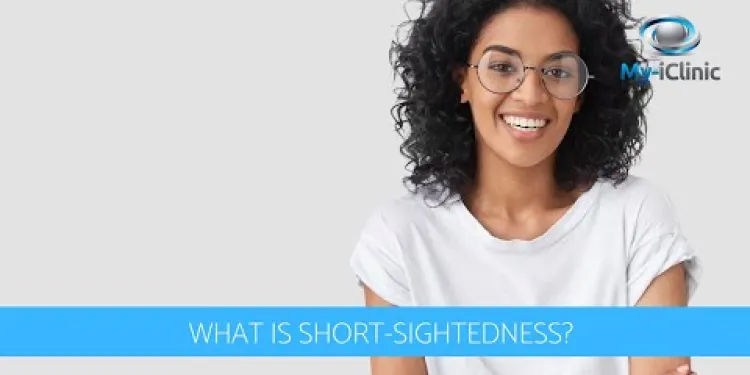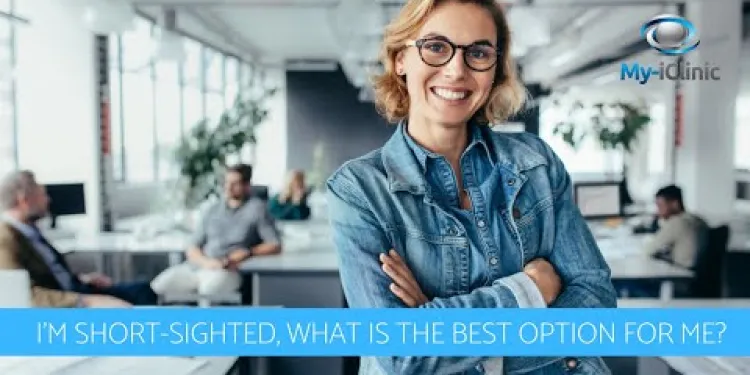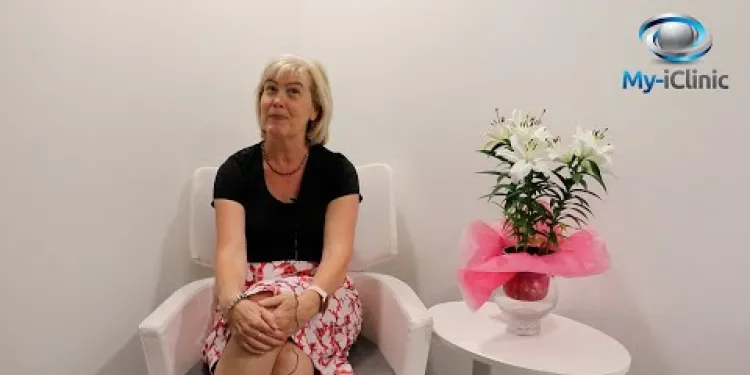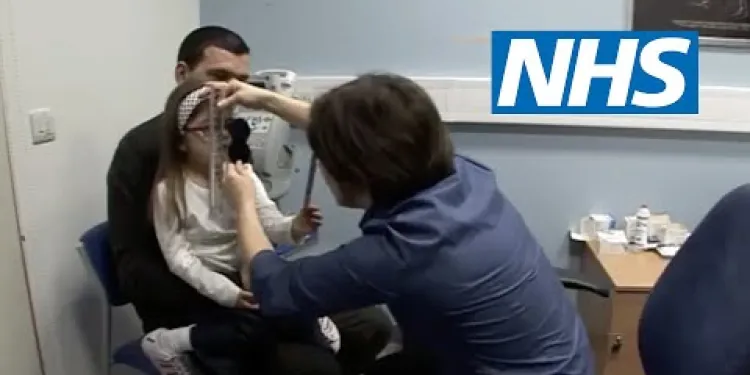Find Help
More Items From Ergsy search
What is Short-Sightedness?
Introduction to Short-Sightedness
Short-sightedness, also known as myopia, is a common vision condition where individuals can see objects near to them clearly, but objects farther away appear blurry. This refractive error occurs when light entering the eye is focused in front of the retina instead of directly on it. Short-sightedness can vary in severity and is usually discovered during childhood or teenage years. In the United Kingdom, myopia is a prevalent condition that continues to grow in numbers, affecting millions of people.
Causes of Short-Sightedness
There are several factors that can contribute to the development of short-sightedness. Genetics play a significant role, meaning children with myopic parents are more likely to develop the condition. Environmental factors are also significant; spending extended periods focused on close-up tasks such as reading, using smartphones, or working on computers can strain the eyes, potentially leading to myopia. Inadequate time spent outdoors during childhood is another contributing factor.
Symptoms of Short-Sightedness
The most common symptom of short-sightedness is difficulty in seeing distant objects clearly. This might include trouble reading road signs, recognizing faces from a distance, or seeing the board in a classroom. Other signs include frequent squinting, eye strain, headaches, and experiencing fatigue when looking at objects far away. It's essential to have regular eye examinations to identify and manage myopia early.
Treatment Options
Several effective treatments are available for managing short-sightedness:
- Eyeglasses and Contact Lenses: These are the most common corrective measures. They help refocus the light on the retina, improving distance vision.
- Orthokeratology (Ortho-K): Specially designed rigid contact lenses are worn overnight to temporarily reshape the cornea, allowing clear vision during the day without the need for glasses or contact lenses.
- Laser Surgery: Procedures like LASIK or PRK reshape the cornea to correct the refractive error permanently.
- Atropine Eye Drops: Low-dose atropine drops can slow the progression of myopia in children.
Preventing and Managing Short-Sightedness
Although you can't entirely prevent short-sightedness, certain measures may help reduce its progression. Encouraging children to spend more time outdoors and take breaks from close-up tasks can be beneficial. Regular comprehensive eye exams are crucial to detect and correct myopia early. Managing screen time and ensuring proper lighting while reading or working are practical steps to maintain eye health.
Short-sightedness is a manageable condition with the right corrective measures and lifestyle adjustments. It's important to seek advice from eye care professionals, such as opticians and optometrists, who can recommend the best course of action tailored to individual needs.
What is Short-Sightedness?
Introduction to Short-Sightedness
Short-sightedness is when you can see things near you clearly, but things far away look blurry. It is also called myopia. This happens because light focuses in front of the back of your eye instead of on it. Many kids and teenagers find out they have this problem. In the UK, many people have short-sightedness.
Causes of Short-Sightedness
There are different reasons why someone might be short-sighted. If your parents are short-sighted, you might be too, because it can run in the family. Also, doing a lot of close-up work like reading or using a phone or computer can make your eyes tired and cause myopia. Not spending enough time outdoors as a child can also contribute.
Symptoms of Short-Sightedness
If you have trouble seeing far away objects, you might be short-sighted. You could find it hard to read road signs, see faces from a distance, or see the board at school. You might squint a lot, or get headaches and tired eyes when trying to see far away. It’s important to get your eyes checked regularly by an eye doctor.
Treatment Options
There are several ways to help with short-sightedness:
- Eyeglasses and Contact Lenses: These help you see far away by making the light focus correctly on your eye.
- Orthokeratology (Ortho-K): You wear special lenses while you sleep, which change the shape of your eye so you can see clearly during the day without glasses.
- Laser Surgery: A doctor can change the shape of your eye using a laser to fix the problem permanently.
- Atropine Eye Drops: These drops can help slow down myopia in children.
Preventing and Managing Short-Sightedness
While you can't stop short-sightedness completely, you can do things to help keep it from getting worse. Encourage kids to play outside more and take breaks when doing close-up work. Get regular eye check-ups to catch and fix myopia early. Manage the time spent on screens and make sure there is good light when reading or working.
Short-sightedness can be managed with the right help and changes to how you live. It's important to talk to eye doctors, like opticians or optometrists, who can tell you the best ways to help your eyes.
Frequently Asked Questions
What is short-sightedness?
Short-sightedness, or myopia, is a common vision condition where distant objects appear blurry while close objects can be seen clearly.
What causes short-sightedness?
Short-sightedness occurs when the eyeball is too long or the cornea is too curved, resulting in light focusing in front of the retina instead of directly on it.
How is short-sightedness diagnosed?
An eye specialist, such as an optometrist, can diagnose short-sightedness during a comprehensive eye examination using tools like retinoscopes and phoropters.
What are the symptoms of short-sightedness?
Symptoms include blurry vision of distant objects, squinting, headaches, and eye strain.
Can short-sightedness be cured?
There is no cure for short-sightedness, but it can be managed with corrective lenses or surgical options.
How can short-sightedness be corrected?
Common correction methods include wearing glasses or contact lenses, and undergoing refractive surgery like LASIK.
Is short-sightedness hereditary?
Yes, genetics play a significant role in the development of short-sightedness. It often runs in families.
Can short-sightedness worsen over time?
Yes, short-sightedness can increase in severity, particularly during childhood and teenage years before stabilizing in adulthood.
Are there any lifestyle changes that can help manage short-sightedness?
Limiting screen time, ensuring good lighting when reading or working, and taking regular breaks to rest the eyes can help manage symptoms.
Can children develop short-sightedness?
Yes, children can develop short-sightedness, often becoming noticeable around the ages of 6 to 12.
Are there any complications associated with short-sightedness?
Severe short-sightedness increases the risk of retinal detachment, glaucoma, and cataracts.
Can I prevent short-sightedness?
While it may not be entirely preventable, regular eye check-ups, spending time outdoors, and reducing near work can help reduce the risk.
How often should I have an eye examination?
Adults should have an eye exam every two years. Children and those at risk of eye problems may need more frequent check-ups.
Does wearing glasses make short-sightedness worse?
No, wearing glasses does not worsen short-sightedness. It simply corrects vision while wearing them.
What is the difference between short-sightedness and long-sightedness?
Short-sightedness (myopia) means distant objects are blurry, while long-sightedness (hyperopia) means close objects are blurry.
What is short-sightedness?
Short-sightedness means you can see things close to you, but things far away look blurry.
If you find it hard to see things far away, you can:
- Wear glasses to make far things clear.
- Visit an eye doctor if you need help.
Short-sightedness is when you can't see things far away very well. Things up close look clear.
What makes people short-sighted?
Short-sightedness means you can see things near you clearly, but things far away are blurry. There are a few reasons why someone might be short-sighted:
- Family: If your mom or dad wears glasses because they are short-sighted, you might need them too.
- Eye shape: Sometimes, the shape of your eye can make things look blurry. If your eye is longer than usual, it can make far things hard to see.
- Reading and screen time: Spending a lot of time reading or looking at screens close to your eyes might affect your sight.
If you think you are short-sighted, ask an adult to help you see an eye doctor. The doctor can check your eyes and help you see better, maybe with glasses.
Short-sightedness means you can't see things far away very well. This happens because the eye is too long, or the front of the eye is too curved. This makes light focus in front of the back of the eye instead of directly on it.
How do doctors find out if you can't see far away?
If you have trouble seeing things that are far away, a doctor can help you. This is called being short-sighted.
Here is how doctors check for short-sightedness:
- You look at a chart with letters on it. The letters start big and get smaller.
- The doctor asks you to read the letters from far away. This helps them see how well you can see.
- Sometimes, you use special glasses while reading the chart. This helps the doctor find the right glasses for you.
If you have trouble seeing the letters, the doctor will help you. They might give you glasses to make your vision better.
An eye doctor can check if you have trouble seeing things far away. They use special tools to look at your eyes. These tools have funny names, like retinoscopes and phoropters, but they help the doctor see if you need glasses.
What happens if you are short-sighted?
When you are short-sighted, you may find it hard to see things that are far away. Some things you might notice are:
- You can't see the board at school clearly.
- Things look blurry when they are far.
- You might squint to see better.
- Your eyes might feel tired or hurt.
It's helpful to have regular eye check-ups with an optician. They can give you glasses or contact lenses to help you see better. Use a good pair of glasses and take breaks from looking at screens.
You might have trouble seeing things that are far away. This can make your vision blurry. You might squint your eyes to try to see better. Sometimes, you can get headaches or your eyes might feel tired.
Can short-sightedness be fixed?
Short-sightedness means you can't see things far away very well. It is also called myopia. There is no magic cure, but you can do things to help. You can wear glasses or contact lenses. These help you see better. You can also have laser eye surgery. This can help some people see well without glasses. Always talk to an eye doctor for help and advice.
You can't completely fix short-sightedness, but you can make it better. Glasses or contact lenses can help you see clearly. Some people also have surgery to help their eyes.
How to fix seeing things far away?
Some people can't see things that are far away. This is called being short-sighted. Here are some ways to help:
- Glasses: Wear glasses to see better.
- Contact Lenses: These are tiny lenses you put in your eyes instead of glasses.
- Eye Doctor: Visit an eye doctor to get the right help.
Ask someone you trust for help. They can help you understand and choose what's best for you.
People often fix their eyesight by using glasses or contact lenses. Some also have special eye surgery called LASIK to see better.
Can you be born short-sighted?
Some people are born with short-sightedness. This means they can't see things far away clearly. If your parents need glasses to see far, you might need them too. A doctor can help you see better if you have trouble with your eyes.
Talking to an eye doctor can help you understand your eyes more. They can check your eyes and tell you if you need glasses. Draw pictures or use bright colors to help remember what the doctor says. Ask family or friends to help you if you have questions about your eyes.
Yes, your genes can make you more likely to be short-sighted. This means it can happen in families.
Can being short-sighted get worse?
Being short-sighted means you can't see things far away clearly. It can get worse as you grow. You might need regular eye check-ups to see if your glasses need changing. Tell an adult if you notice changes in your vision.
Some tools can help you see better:
- Glasses or contact lenses
- Regular eye tests
- Eye exercises recommended by your eye doctor
Yes, short-sightedness can get worse, especially when you are a child or teenager. It usually stops getting worse when you become an adult.
Can changing how I live help my eyes if I can't see far away?
If you have trouble seeing things that are far away, there are some things you can do to help.
- Take breaks when using screens like computers, tablets, or phones.
- Go outside and play to give your eyes a rest.
- Eat healthy foods like fruits and vegetables to keep your eyes strong.
- Visit an eye doctor to check your eyes and get glasses if you need them.
- Try to blink often to keep your eyes wet and comfortable.
Try these tips to help your eyes feel better. If you're not sure, ask an adult or eye doctor.
Spend less time looking at screens. Make sure the lights are bright when you read or work. Take regular breaks to rest your eyes. This can help your eyes feel better.
Can kids get short-sightedness?
Can kids' eyes have trouble seeing things far away? This is called short-sightedness. When kids are short-sighted, they can see things close to them, but things far away look blurry.
If you think your child might be short-sighted, you can help them. Take them to an eye doctor. They can check your child's eyes. The doctor might give them glasses to help see better.
Make sure your child takes breaks from screens and goes outside to play. This can help keep their eyes healthy.
Yes, children can have trouble seeing far away. This is called short-sightedness. It usually starts when kids are between 6 and 12 years old.
Can being short-sighted cause problems?
If you have strong short-sightedness, your eyes can have problems. These problems may include:
- The back of your eye (called the retina) can come away. This is called retinal detachment.
- Your eye may get too much pressure. This is called glaucoma.
- Your eye lens can get cloudy. This is called cataracts.
If you are worried, talk to an eye doctor for help.
Using tools like larger print books and audiobooks can also help.
Can I stop my eyes from needing glasses to see far away?
Some people can't see things far away clearly. This is called short-sightedness.
Here are some tips to help:
- Go outside and play in the sunlight. It helps your eyes stay healthy.
- Take breaks when you use a computer or watch TV. Every 20 minutes, look at something far away for 20 seconds.
- Hold books and screens at a good distance from your eyes. Not too close!
- Ask an adult to take you to the eye doctor for regular check-ups.
These tips can help keep your eyes healthy.
We can't stop it completely, but we can do things to help. Get your eyes checked often. Spend time outside. Try to take breaks from reading or looking at screens closely.
How often should I get my eyes checked?
Grown-ups should get their eyes checked every two years. Kids and people who might have eye problems need to see the eye doctor more often.
Do glasses make your eyes worse if you can't see far?
If you have trouble seeing things that are far away, you might wear glasses. Some people think that wearing glasses can make your eyes get worse. But this is not true. Glasses help you see better. If you can't see well, it is important to wear your glasses. They won't make your eyes worse.
If you have more questions or need help, you can:
- Talk to an eye doctor. They can help you understand more.
- Ask an adult you trust to explain things to you.
No, wearing glasses does not make your eyesight worse. Glasses help you see better when you wear them.
What is the difference between being short-sighted and long-sighted?
Do you know why some people need glasses? It can be because they are short-sighted or long-sighted.
Short-sighted means you can see things near you clearly, but things far away look blurry.
Long-sighted means you can see things far away clearly, but things close to you look blurry.
If you have trouble seeing, you might need an eye test.
Some people use glasses or contact lenses to help them see better.
A helpful tool is a magnifying glass to see things bigger.
Short-sightedness means things far away look blurry. Long-sightedness means things close up look blurry.
Useful Links
This website offers general information and is not a substitute for professional advice.
Always seek guidance from qualified professionals.
If you have any medical concerns or need urgent help, contact a healthcare professional or emergency services immediately.
Some of this content was generated with AI assistance. We’ve done our best to keep it accurate, helpful, and human-friendly.
- Ergsy carfully checks the information in the videos we provide here.
- Videos shown by Youtube after a video has completed, have NOT been reviewed by ERGSY.
- To view, click the arrow in centre of video.
- Most of the videos you find here will have subtitles and/or closed captions available.
- You may need to turn these on, and choose your preferred language.
- Go to the video you'd like to watch.
- If closed captions (CC) are available, settings will be visible on the bottom right of the video player.
- To turn on Captions, click settings .
- To turn off Captions, click settings again.






